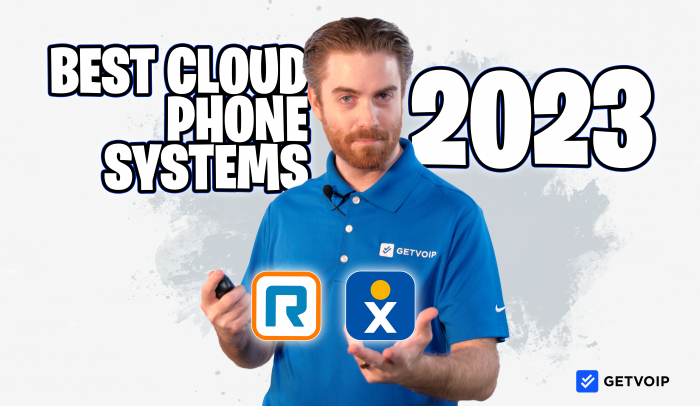Cloud phone systems offer numerous advantages over landline telephones and on-premise PBX systems, including advanced call-handling features, cost efficiency, and flexible plans.
We’ve researched and tested the best cloud phone systems so you don’t have to–and we’re sharing new insights into provider pricing and plans, features and customer service, network reliability, and more in this post.
Quick links:
- Overview of Top Cloud Phone System Providers
- Best Cloud Phone Systems for 2023
- What is a Cloud Phone System?
- Benefits of a Cloud Phone System
- Potential Downsides of Cloud Phone Systems
- Key Cloud Phone System Features
- Cloud Phone System vs Traditional Phone System
- How To Choose A Cloud Phone System
- Cloud Phone System FAQs
Overview of Top Cloud Phone System Providers
The comparison table below outlines our top cloud phone system picks, their pricing options, available communication channels, and ideal user base.
| Provider | Pricing | Available Channels | Best For |
| Nextiva | 3 paid plans from $18.95-$32.95/user/month (annual pricing) | – Voice Calling
– Video Meetings – SMS Texting – Team Chat Messaging |
Small to Midsize remote, in-house, or blended teams needing an all-in-one customer service-centric UCaaS system with voice calling, team collaboration, and CRM tools |
| RingCentral | 3 paid plans from $20-$35/user/month (annual pricing) | – Voice Calling
– SMS and MMS Texting – Chat Messaging – Team Collaboration – Video Calling – Integrations to third party tools |
Companies of any size needing advanced video, text and chat features with enterprise-grade encryption and security |
| Zoom Phone | 3 pay-as-you-go plans from $10-$20/user/month | – Video Meetings (Zoom Meetings license required to use Zoom Phone)
– VoIP Voice Calling – SMS Texting – Team Chat Messaging |
Current Zoom Meetings users needing VoIP calling, chatting, team collaboration, and high-level integrations within the Zoom interface |
| Vonage | 2 paid plans from $19.99-$39.99/line/month (annual pricing) | – Voice and Video Calling
– SMS/MMS -Team Chat/Collaboration |
Vonage Business Communications is best for companies that want core communication channels–voice, team chat, SMS, video–but don’t need bells and whistles with routing or queueing. |
| GoTo Connect | 2 paid plans from $24-$29/user/month (annual pricing) | – Voice and Video Calling
-Team Chat/Collaboration – SMS – Virtual Faxing |
GoTo Connect is best for Value-focused smaller teams with a high daily call volume that require ease of use and customizable phone system solutions. |
| Dialpad | 3 paid plans from $15.00-$25.00+/user/month (annual pricing) | – Voice and Video Calling
– Online Faxing – SMS and MMS -Team Chat/Collaboration |
Teams or startups with a call volume outpacing their current number of agents, teams wanting to use AI voice technology to optimize and automate the customer experience |
| Ooma Office | 3 paid plans from $19.95 – $29.95/user/month | – Voice and Video Calling
– SMS – Virtual Faxing |
In-house small or local businesses looking for a cost-effective and basic voice and video solution without advanced call handling features |
Best Cloud Phone Systems for 2023
The most popular and reliable cloud-based phone systems are:
1. Nextiva
Nextiva is a business cloud communications platform with a cloud phone system combining VoIP voice calling, video meetings, SMS, and team chat messaging in one dashboard.
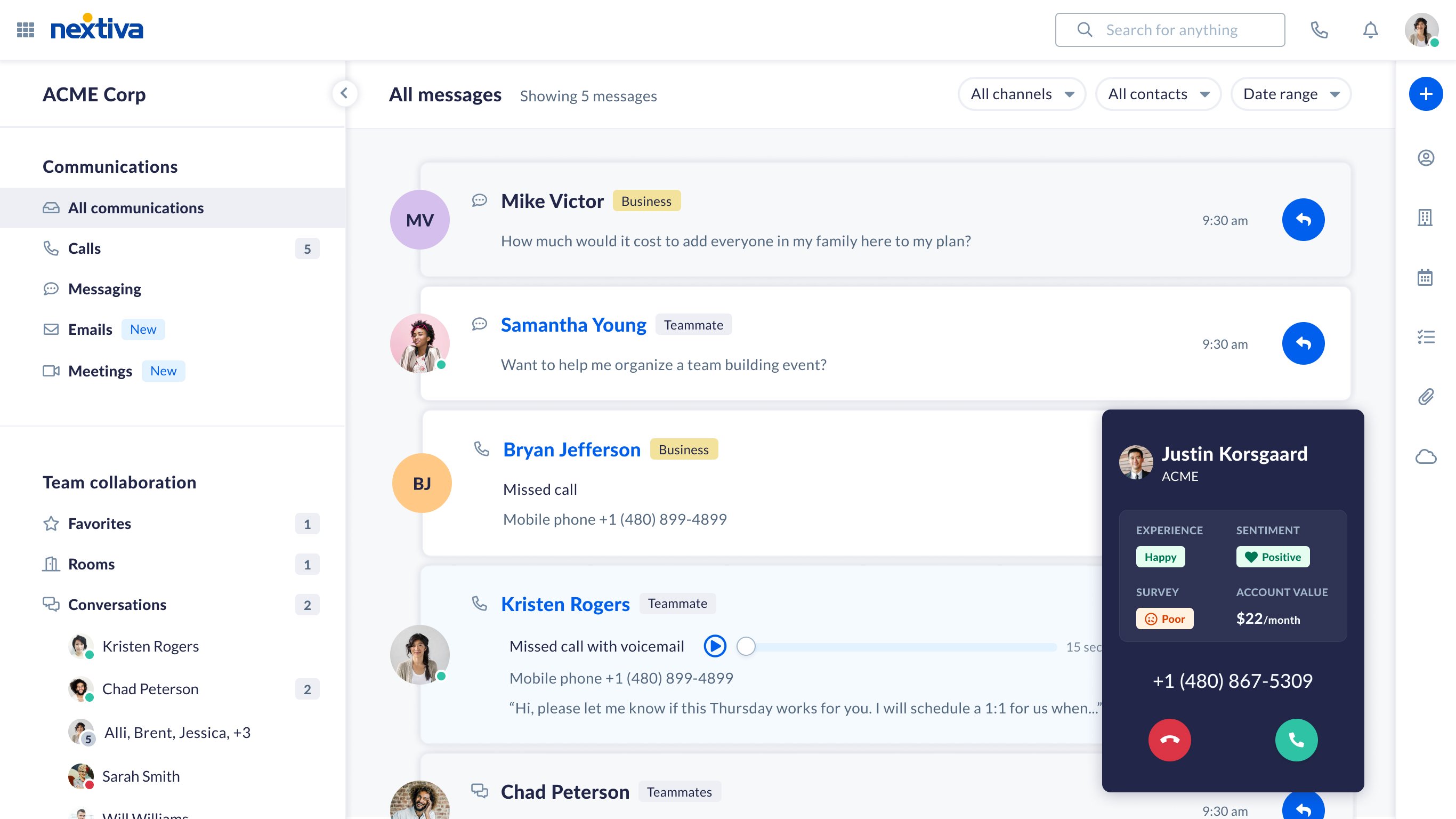
Pricing and Plans
Nextiva offers three paid plans for 1-100+ users, payable on a monthly or annual basis. A 14-day free trial is available. Annual pricing for 20-99 users is:
- Essential Plan (From $18.95/user/month): Includes unlimited US/Canada calling, 45-minute video calls with video recording, free local number and toll-free number with 1,500/toll-free monthly minutes, Voicemail-to-Email, unlimited virtual faxing, call logs, call groups, basic auto-attendant, team chat with user presence, calendar integrations, iOS/Android mobile app, 24/7 customer support
- Professional Plan (From $22.95/user/month): Adds 40-participant conference calls, 1000 SMS/user/month, Voicemail-to-SMS, multi-level auto attendant, Salesforce, Zendesk, Hubspot, and CRM integrations
- Enterprise Plan: (From $32.95 /user/month): Adds unlimited conference calls, 2000 SMS/user/month, 12,500 toll-free minutes/month, call recording, high-level integrations with Microsoft Teams, ServiceNow, Oracle, voicemail transcription, SSO
Security and Customer Support
Nextiva security includes:
- 24/7 network monitoring
- Backup power sources
- 8 global points of presence and a 99.999% uptime
- SOC II, HIPAA, and PCI compliant
- End-to-end call encryption
Nextiva support options includes:
- Customer support via live chat, email, and phone,
- Online knowledge base/user portal
What Sets It Apart
Standout Nextiva features include:
- Native CRM: Automatically collects, updates, and displays essential CRM data via on-screen call pops showing customer details, account value, notes, and interaction history
- Customer Sales and Service Tools: Case routing, customer journey mapping and analytics, deal tracking and lead management, task management, automated follow-ups
- AI Analytics: Real-time sentiment analysis and customer alerts via keyword recognition, trend forecasting, call topic filters, customer survey analytics, KPI-based reporting templates
- Smart Automation: Automated welcome messages, reminders and follow-ups with status updates, real-time agent assist with knowledge base integration
Where It Falls Short
Potential downsides to Nextiva include:
- Video calls limited to 45 minutes/meeting on all plans, putting Nextiva far behind most of its competitors offering unlimited video conferencing
- Essentials plan lacks SMS texting, conference calls, CRM integrations and tools, call recording, multi-level auto attendant, and other key features that render it useless to many businesses
- Expensive compared to competitors, especially because pricing varies by number of users and month-to-month pricing increases costs by roughly 20-25%
2. RingCentral MVP
RingCentral MVP (Message, Phone, Video) is a unified communications platform offering high-level communication features to smaller teams.
RingCentral offers chat, voice and video calling, virtual faxing, and SMS.
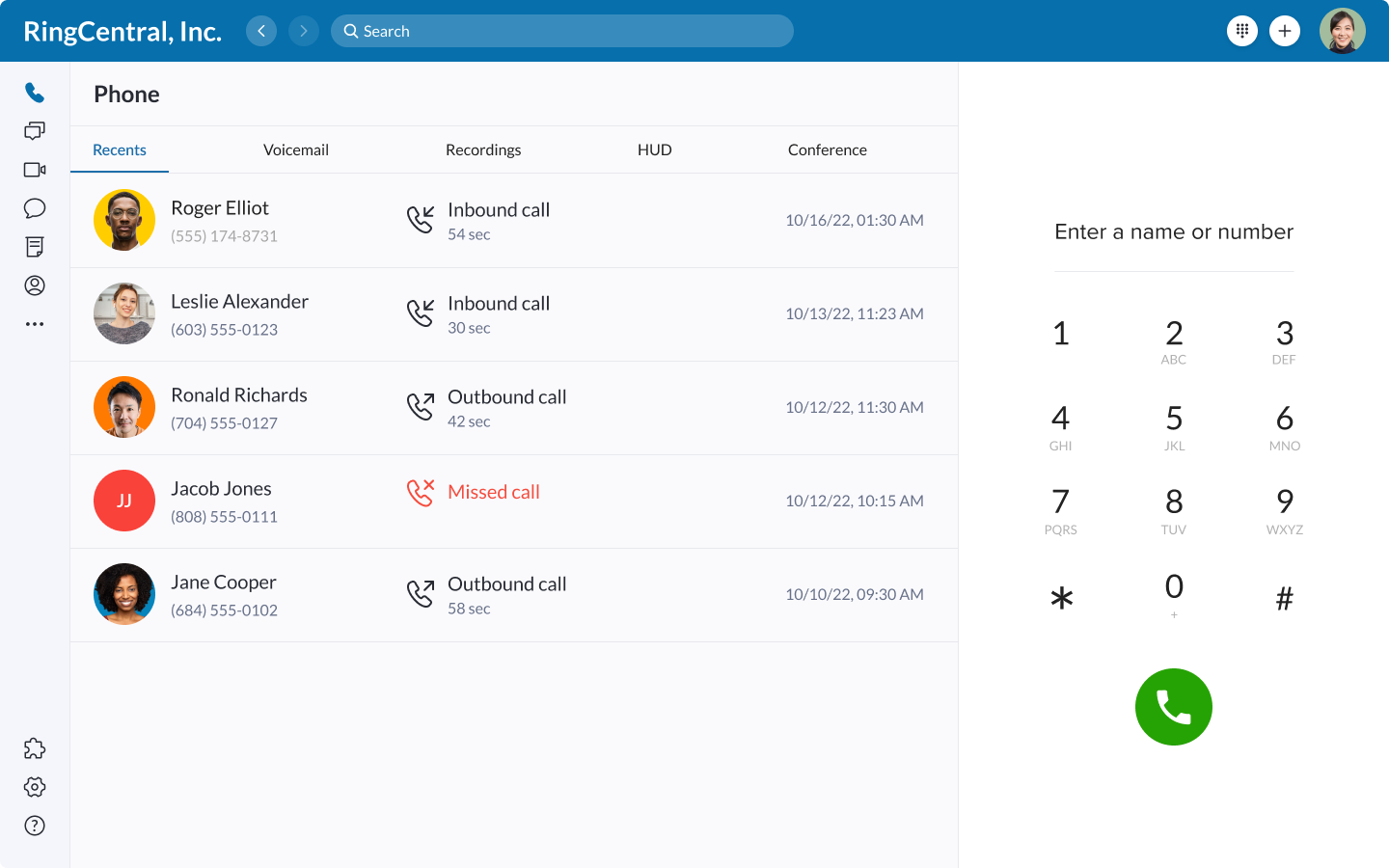
Pricing and Plans
RingCentral MVP Intelligent Phone Solutions offers a 14-day free trial and three paid plans:
- Core Plan($20/user/month): Includes unlimited local calling, 25 Enhanced SMS messages/user/month, visual voicemail, local/toll-free number, on-demand call recording, multi-level IVR, basic call queues, team chat and file/screen sharing, unlimited audio conferencing, 100-participant video calls with unlimited recording, breakout rooms, whiteboarding, AI Meeting Insights and Live Transcription
- Advanced Plan ($25/user/month): Adds automatic call recording, advanced call routing and rules, call barge/call whisper/call monitoring, 100 SMS/user/month, unlimited virtual faxing, Business Analytics Essentials, CEM integrations, industry-specific integrations,
- Ultra Plan ($35/user/month): Adds 10,000 toll-free minutes/month and 200 SMS/user/month, unlimited storage, Business Analytics Pro, Device alerts and analytics
Add-ons include additional local phone numbers, ($4.99/user/month), international numbers ($5.99/user/month), vanity numbers ($30.00 fee/number), and high volume SMS.
Security and Customer Support
RingCentral support includes:
- 24/7 customer support via phone and live chat
- 99.999% guaranteed uptime
- Online knowledge base with video tutorials and on-demand and live training webinars
- RingCentral University
RingCentral security includes:
- Third-party security testing
- GDPR, SOC II, HIPAA, SSAE-16 compliance
- End-to-end encryption
- SSO and 2FA
What Sets It Apart
Standout RingCentral capabilities include:
- Customer Self-Service: 250 programmable IVR call menus and submenus, advanced NLP, drag-and-drop Visual Dial Plan Editor
- Team Collaboration Tools: Team Huddle, task management, whiteboarding, collaborative notes, AI-powered meeting summaries with suggested action items, complete transcription with speaker differentiation, featured snippets and keywords
- Call Queues: Call groups with 16 lines/group, call routing strategies (simultaneous ring, round robin, sequential, business hour routing), set custom ring time/number of rings, enable remote call forwarding
- Enhanced Business SMS: Prebuilt and custom SMS integrations, attach audio files, videos, emojis, and files with preview, 1000 characters/message, SMS search bar, spam blacklists, two-way messaging, SMS campaign management
What Needs Improvement
Potential RingCentral downsides include:
- Core Plan lacks call monitoring, virtual faxing, and essential CRM app integrations
- Constant updates can cause delays, frequent user training required
- Users frequently complain of low call quality and jitter, as well as missing fax pages/failure to send/receive faxes
3. Zoom Phone
Zoom Phone provides current or prospective Zoom users with a cloud phone system they can use alongside Zoom Meetings, eliminating the need to purchase a VoIP solution from a separate provider.
Available Zoom Phone communication channels are voice calling, texting, instant chat messaging, and video calling.
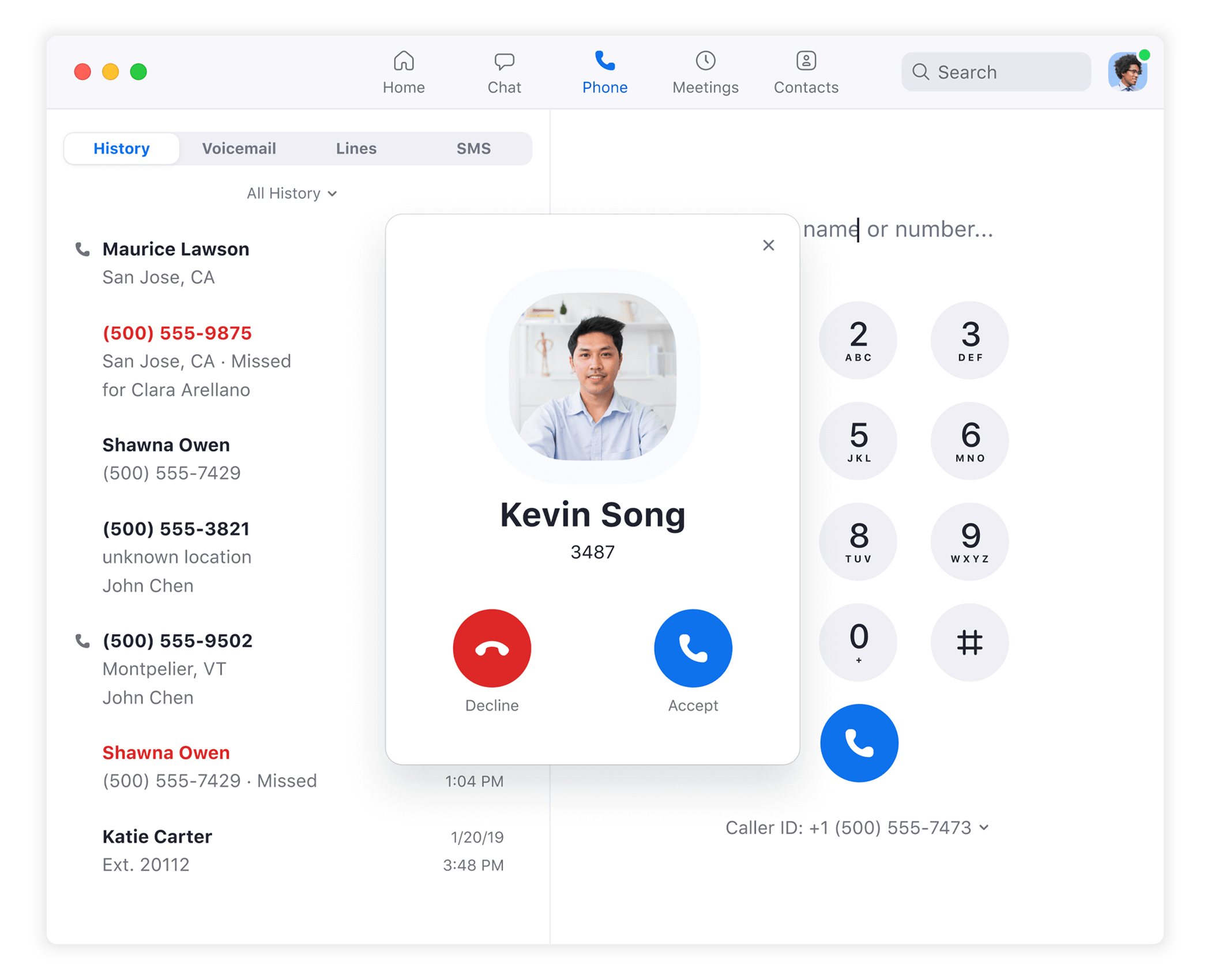
Pricing and Plans
Zoom Phone offers three plans–a pay-as-you-go metered plan, an unlimited regional calling plan, and an international phone plan:
- US & Canada Metered ($120/year/user): Includes unlimited international calling, metered outbound calling, domestic SMS/MMS, toll-free numbers, voicemail transcription, ACD, IVR, call queueing, call recording, call park, call flip, team chat, hot desking, Zoom Meetings, Slack/Salesforce/Google/Microsoft Integrations
- US & Canada Unlimited ($180/year/user): Adds Unlimited internal/outbound regional calling, domestic SMS/MMS, 19-country international calling available as an add-on, Zoom Meetings, unlimited IVR, call recording, call park
- Global Select ($240/year/user): Adds unlimited internal/outbound calling in 48 countries, Domestic SMS/MMS, Direct Dial Number, 24/7 support via chat/phone, voicemail transcription, unlimited IVR/auto attendants, Zoom Meetings,
Add-ons like additional phone numbers and toll-free numbers, ($60.00/year) international calling ($120.00/year) and the Zoom Phone Power Pack ($300.00/year/user) are available.
Security and Customer Support
Zoom security includes:
- AES 256-bit encryption
- SSO and two-factor authentication
- FEDRamp, PCI, GDPR, and HIPAA compliance
Zoom customer support includes:
- 24/7 phone and chat support
- On-demand and live training webinars
- Onboarding assistance
- Paid premiere support plans
What Sets It Apart
Standout Zoom Phone features include:
- Robust Mobile App: iOS/Android mobile applications include call transfer, call recording, conference calls, call flip, call monitoring, call park, access voicemail and voicemail transcriptions, view call recordings, nomadic e911, mobile video meetings with collaboration tools
- Zoom Meetings: Advanced web conferencing capabilities on desktop/mobile devices including screen sharing, chat messaging, local and cloud meeting recording, multiple meeting views/filters/virtual backgrounds, live reactions, polling/Q&A, in-meeting app integrations, co-annotation and file sharing, whiteboarding, meeting cohost, waiting room and host controls
- Auto Receptionist: Dial-by-name directory, multi-level IVR, shared lines and shared voicemail inbox, call queuing, external contact forwarding, call delegation
What Needs Improvement
Potential Zoom Phone downsides include:
- Users are required to have an existing Zoom Meetings account, which may mean businesses choose to upgrade to the more expensive Zoom One Business Plus plan, which starts from $250/year/user
- Some key features, like larger meeting capacities of 500-1000 participants, audio conferencing, additional cloud storage, and the Zoom Phone Power Pack for call centers are available only as add-ons–which can quickly add up
- Unlimited outbound calling, a staple included in most basic VoIP provider plans, is available starting only on the Zoom Phone Unlimited Plan. International calling is also limited compared to Zoom competitor
4. Vonage Business Communications
Vonage Business Communications is a UCaaS application bundling a cloud phone system, SMS texting, team chat and collaboration, and unlimited video conferencing with up to 100 participants per meeting.
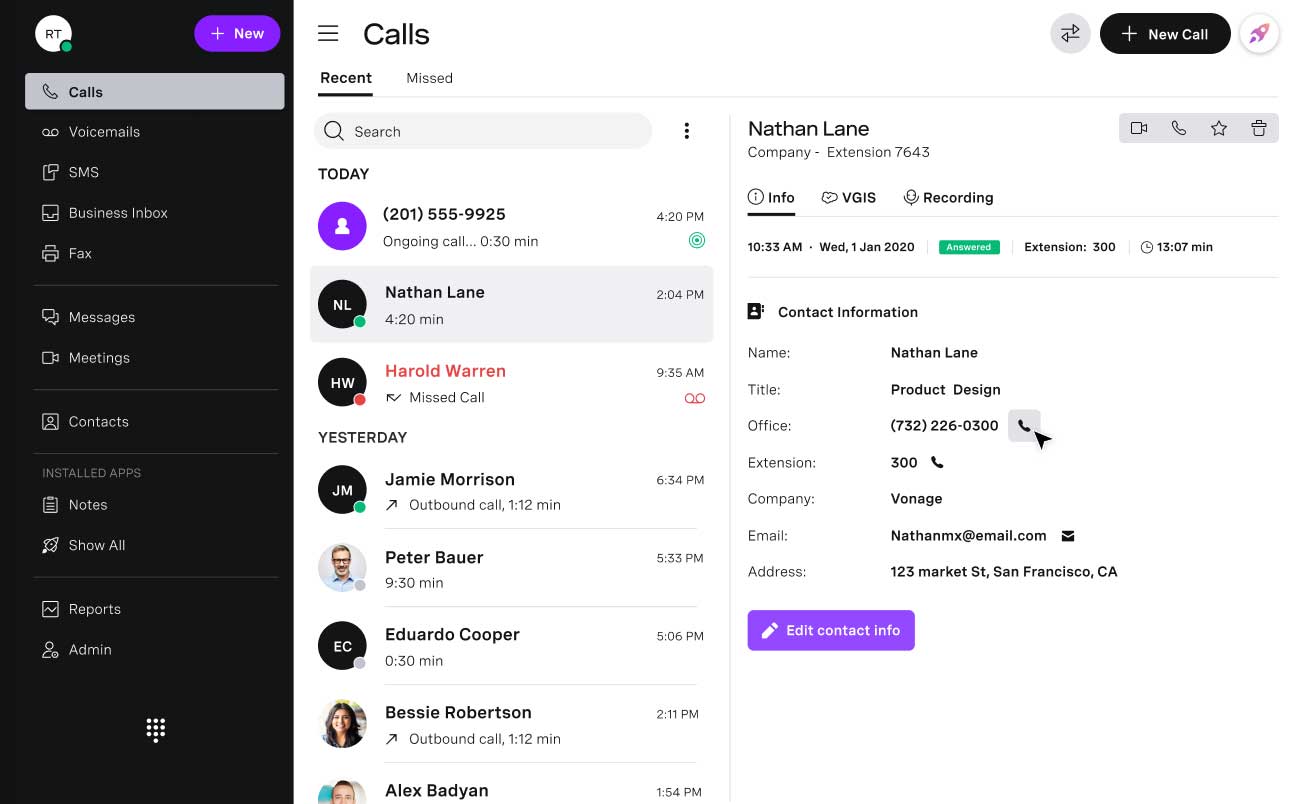
Pricing and Plans
Vonage offers three pricing plans:
- Mobile Plan ($19.99/user/month): Includes desktop app and mobile app, unlimited calling and SMS with 50+ phone features, unlimited team messaging, Vonage App Center, basic auto attendant, call announce, call blocking, call tagging, call screening, hold music, Never Miss A Call
- Premium Plan ($29.99/user/month): Adds IP desk phone access, unlimited video meetings for 100 participants, multi-level auto attendant, CRM integrations
- Advanced Plan ($39.99 /user per month): Adds on-demand call recording (15 hours,) call groups, visual voicemail
Security and Customer Support
Vonage’s VoIP support includes:
- 99.999% uptime
- 24/7 live phone, email, and chat support for all users
- On-demand tutorials and articles
Unfortunately, as of this writing, there is a lack of transparency regarding Vonage Business Communications security features.
What Sets It Apart
Vonage Business Communication offers a well-rounded UCaaS platform, and its best features include:
- Business Inbox: Add-on feature with a multichannel inbox organized by individual customer conversation across SMS, MMS, and Facebook Messenger. Users can share photos, attachments, audio, and video, switch between channels during a single conversation, and access interaction history
- Never Miss A Call: Includes call forwarding, Find Me/Follow Me, Simultaneous Ring/Call Blasting, Do Not Disturb, and voicemail messaging. Lets team members customize their own call forwarding path and set designated phone numbers
- Vonage Meetings: Desktop/cell phone video calling with active speaker view, waiting room, dial-in access from 60 countries, meeting lock, one-click video meeting, whiteboarding, in-meeting chat, calendar tool integrations (Microsoft Outlook, Google Calendar, etc.), virtual background, meeting recording, file sharing, HIPAA Compliant video calls
What Needs Improvement:
Potential downsides to Vonage Business Communications include:
- Low overall value compared to competitors, especially given that essential features like automatic recording, call queues, conference bridge, virtual faxing, and more are all available only via paid add-on
- Mobile Plan, the most affordable option, doesn’t include Vonage Video meetings nor does it connect to existing IP phones
- On-demand call recording, a standard in most providers’ basic plans, is only available on the most expensive plan, which starts at $40/line/month
5. GoTo Connect
GoTo Connect is a cloud communications solution and phone system offering voice calling, video communications, and messaging in a unified interface. Local, toll-free, and vanity numbers are available, as is number porting.
Remote or blended smaller teams of up to 25 employees will get the most out of GoTo Connect, as will current GoTo universe users (GoTo Webinar, GoTo Meeting, etc.) needing a business phone system.
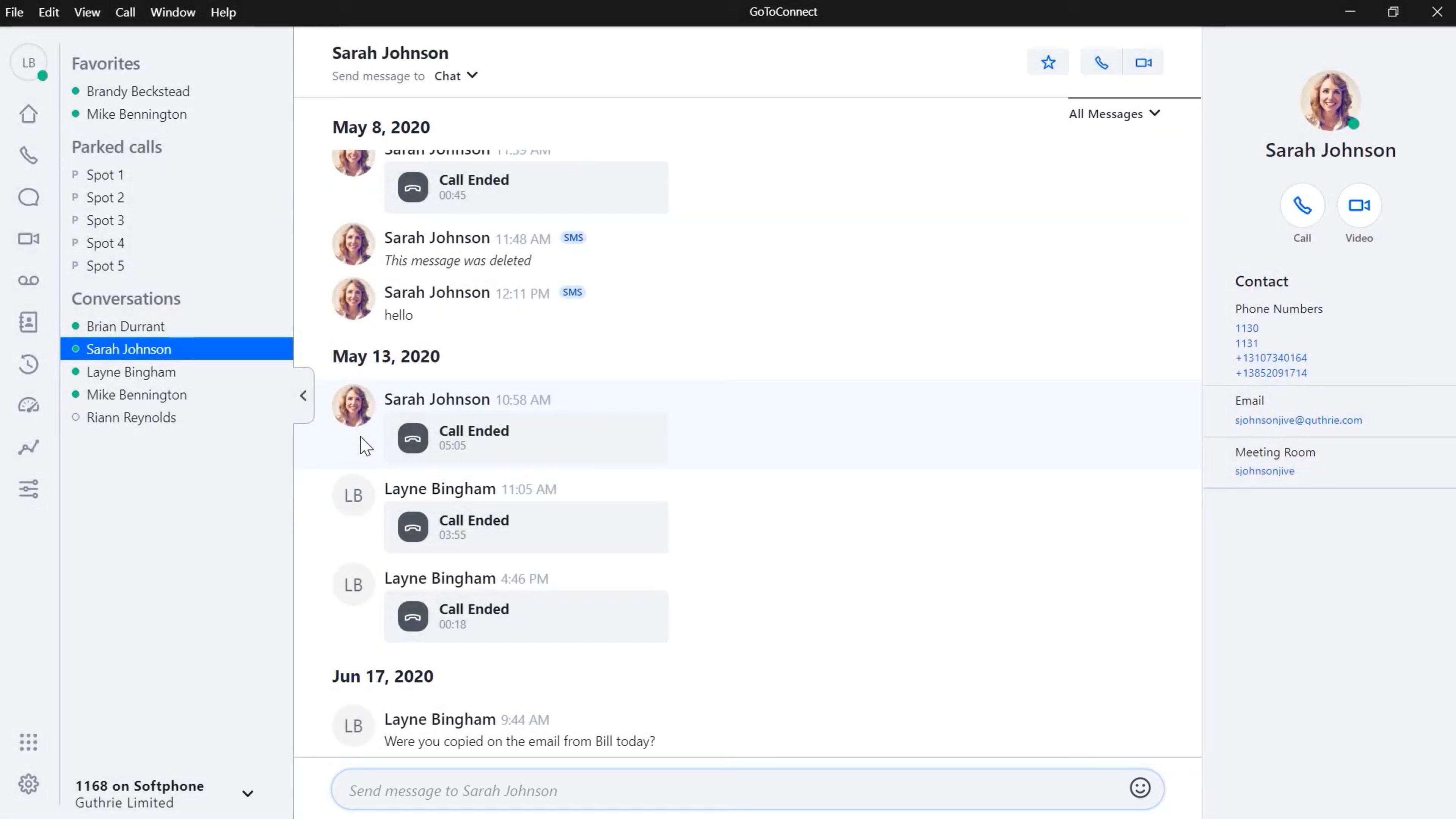
Pricing and Plans
GoTo Connect offers a 14-day free trial and two paid plans:
- Basic Plan (From $24/user/month): Includes unlimited VoIP calling, local, toll-free, and vanity numbers, International calling (per-minute charges), smart call routing, unlimited extensions, 1 auto attendant, 1 Custom Dial Plan, 1 call queue, call forwarding, Instant Response, team chat messaging, audio conferencing, unlimited video calls for up to 4 participants, 40 SMS credits/month, 24/7 support
- Standard Plan (From $29/user/month): Adds unlimited auto attendants/Custom Dial Plans/Call Queues/Multisite Compatible, Smart Notes, Miro Integration, hot desking, virtual faxing, free VoIP phone calling in 50+countries, voicemail-to-email, call recording, advanced live analytics, 80 SMS credits/month, unlimited video conferencing for up 250 participants,
Additional phone numbers are available from $5.00/number per month.
Security and Customer Support
GoTo Connect support includes:
- 24/7 phone/live chat support for top two plans
- Email and support ticket generation for all plans
- 99.996% uptime with 10 global data centers
GoTo Connect security includes:
- HIPAA, GDPR, CCPA, and SOC II Type II compliance
- TLS/AES-256 encryption
- two-factor authentication
- Malware/firewall protection
What Sets It Apart
Top GoTo Connect features include:
- Dial Plan Editor: Easy-to-use call flow management tool with customized advanced call routing, call forwarding, call waiting, and multi-level IVR with unlimited auto-attendants and submenus
- Smart Call Routing: Intelligent, skills-based call routing based on customer IVR input
- Instant Response: Custom pre-written SMS text messages are automatically sent to missed calls from new customers
- Smart Notes: Smart Assistant uses AI to automatically create meeting highlights, action items, transcribe the meeting, and bookmark key moments. Users can also take and share real-time, in-meeting notes
What Needs Improvement
Potential GoTo Connect downsides are:
- Limited third-party integrations, seemingly designed to push users to invest in the entire GoTo suite even if other business tools better suit them
- Poor customer service reputation, and self-service chatbot (the only support option for the cheapest plan) is unable to offer even basic assistance
- Lack of scalability compared to other providers, as GoTo Connect offers only two paid plans–access to additional features aren’t available via add-ons, and require users to upgrade to the more expensive Contact Center plan
6. Dialpad
Dialpad Business Communications is a cloud phone system offering voice calling, online faxing, video calling, team chat, and business texting for desktop and mobile users in a unified interface.
Its main selling points are its advanced built-in AI, easy-to-use interface, and overall affordability.
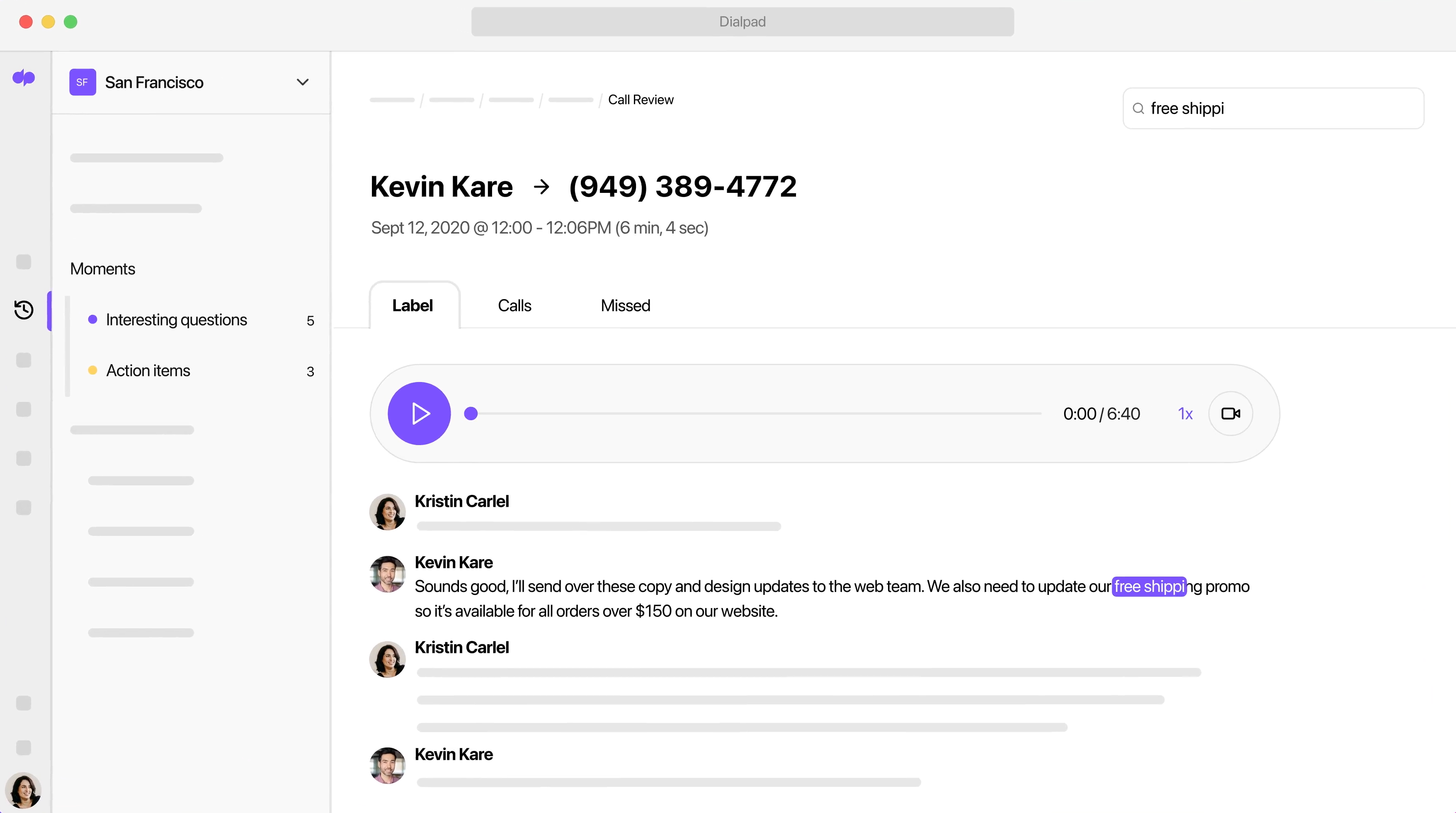
Pricing and Plans
Dialpad Business Communications offers three paid plans and a 14-day free trial:
- Standard Plan (From $15/user/month): Unlimited HD Voice calling, multi-level auto attendant, 1 local business number, visual voicemail, 3 ring groups, custom call routing and forwarding, call recording, spam detection, call flip,
- Pro Plan(From $25/user/month): Adds local phone numbers in 70+countries, 25 ring groups/10 office locations, global SMS, Microsoft Teams/CRM integrations, 24/7 live agent support
- Enterprise (Custom Pricing): Adds unlimited extensions, 100% uptime, SSO, dial-by-extension, unlimited ring groups/office locations
Security and Customer Support
Dialpad security includes:
- 256–bit AES encryption
- SRTP and TLS, SOC 2 Type 2, HIPAA, CSA, GDPR compliance
- CCPA adherence
- Custom data retention policies
Dialpad support includes:
- 100% SLA guaranteed uptime for Enterprise users (99.9% for other plans)
- 24/7 phone support is included on Pro and Enterprise plans
- 24/7 chat and online ticketing on all plans
- Paid support add-ons
What Sets It Apart
Standout Dialpad functionality includes:
- Voice Intelligence: AI-powered NLP and machine learning platform with in-call agent coaching/Agent Assist, real-time speaker-differentiated call transcription, automatic sentiment analysis, automatic post-call notes
- Advanced Call Routing: Skills-based, language-based, department-based, most idle, fixed order, round-robin, or random routing, fallback routing plans
- Team Collaboration: Video meetings with screen sharing, audio-only conferencing, file sharing, message threading, in-meeting/persistent team chat, Miro Whiteboard integrations
- Ai Analytics: Voicemail transcription, AI meeting Recaps with summaries, action items, and meeting highlights
What Needs Improvement
Potential Dialpad downsides include:
- Lack of integrations on Standard plan (Google Workspace/Microsoft 355 only)
- Excellent overall value, but lack of scalability compared to competitors
- Advanced AI features mean a higher learning curve
7. Ooma Office
Ooma Office is a basic small business phone solution offering voice and video calling, virtual faxing, and SMS messaging.
It integrates with a high number of third-party desk phones and also offers native phone hardware for sale on its website.
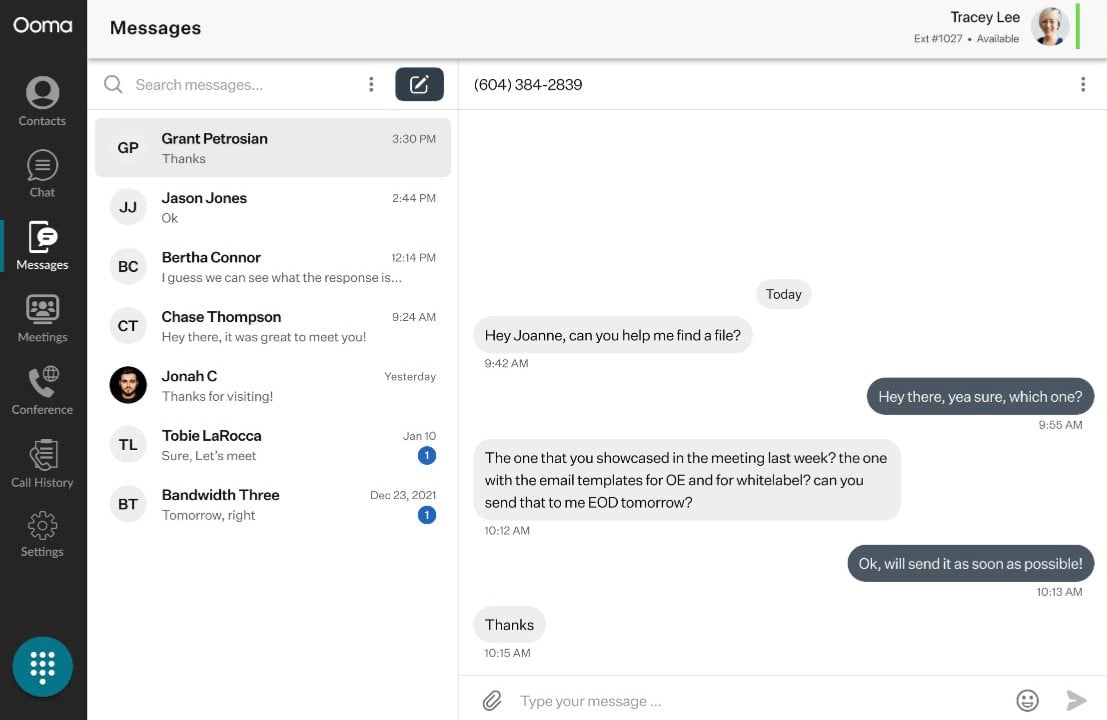
Pricing and Plans
Ooma Office offers a 30-day money-back guarantee and three paid plans:
- Ooma Office Essentials ($19.95/user/month): Includes a user extension, local phone number, unlimited US, Canada, and Mexico calling
- Ooma Office Pro ($24.95 /usermonth): Adds Ooma Meetings for video, call recording, enhanced call blocking, voicemail transcriptions
- Ooma Office Pro Plus: ($29.95/user/month): Adds hotdesking, call queuing, CRM integrations
Security and Customer Support
Ooma Office isn’t particularly transparent about their security measures. Contacting customer support research revealed Ooma doesn’t offer two-factor authentication, isn’t HIPAA-compliant, and only offers end-to-end encryption between Ooma users. Most importantly, Ooma does not offer a guaranteed uptime.
Ooma support includes:
- 24/7 live chat for all Ooma customers
- Phone support Monday-Friday 5:00AM-5:00PM and Saturday-Sunday 8:00AM-5:00PM
What Sets It Apart
Standout Ooma Office features include:
- Caller Info Match: Captures CRM, social media, and search engine data on leads (LinkedIn, Facebook, Google) which is shown via CRM call pop during live calls
- Enhanced Call Blocking: Lets admins block up to 100 users, automatically block calls from anonymous/unknown numbers, and automatically block known spam callers on the Community Blacklist
- Mobile App for iOS/Android Devices: Access visual voicemails, edit call flows, use in-app extension dialing, send SMS messages, and update user preferences in addition to standard business calling/team collaboration tools
What Needs Improvement
Potential downsides of Ooma Office include:
- Non HIPAA-complaint, no guaranteed uptime, limited security standard disclosure
- Lack of native team chat messaging necessitates third-party integrations
- Most affordable plan lacks key features like call recording/routing/monitoring, video calling
What is a Cloud Phone System?
A cloud phone system is a Voice Over Internet Protocol (VoIP) business telephone solution that a third-party provider hosts on a cloud server instead of on-premise PBX (Private Branch Exchange) hardware.
Cloud-based phone systems aren’t tied to a single physical location and are therefore accessible on any Internet-connected device (desktop and laptop computers, mobile phones, tablets, compatible desk phones via softphone interface).
Cloud phone systems (sometimes called hosted PBX) have more advanced features than traditional landlines, offer higher flexibility for a lower price, and streamline business communication within a single platform.
Benefits of a Cloud Phone System
The top benefits of a cloud phone system include:
- Cost Savings: Free unlimited local/long distance calling, affordable international calling, monthly and annual billing options (annual billing offers a high discount), doesn’t require purchasing a new phone or expensive on-premise equipment, only pay for features/user seats currently needed
- Mobility and Flexibility: Ideal for remote/blended teams, virtual phone systems are accessible on any device with an Internet connection. Agents can take calls on their preferred devices from any location and switch devices during active calls
- Scalability: Add individual features/seats a la carte via paid add-ons, or scale up to the next plan tier for bundled feature access
- Advanced Features: Advanced VoIP features like remote call forwarding, visual voicemail, automated/on-demand call recording and transcription, video conferencing, team collaboration tools, and multi-level IVR/virtual receptionists increase team productivity, shorten the sales cycle, and improve the customer experience
- Quick Setup Process: Businesses can use existing equipment, port in existing business phone numbers, and add users/features with a few clicks. Cloud phone system providers offer onboarding, training webinars, and custom setup processes if needed
- Increased Team Collaboration and Productivity: Live team chat messaging with user tagging, user presence, and file sharing increase team collaboration and employee engagement while keeping the workload balanced. Features like real-time Agent Assist, CRM screen pops, and workflow automations cut down on busy work and let agents access key customer data instantly
- Improved Customer Satisfaction: IVR, auto attendants, and ACD provide 24/7/365 customer self-service, while call routing shortens call hold times and average handle times by connecting customers to the best available agent. Cloud phones boost first call resolution rates and increase customer loyalty
Potential Downsides of Cloud Phone Systems
Potential downsides of using cloud-based phone systems include:
- Initial adoption may have a steep learning curve
- Depending on the service provider, some essential business needs and features may only be available as a paid add-on, third-party integration, or on more expensive tiers–which can add to initial costs
- Because call quality is impacted by the strength of your Internet connection, audio issues like jitter, latency, and packet loss may require upgrading to a better ISP or higher bandwidth (another expense to business owners)
- Usually requires a commitment/contract for at least 1-2 years, breaking contracts early incurs hefty fees
Key Cloud Phone System Features
The most important cloud phone service features are:
- Business Phone Numbers: Number porting, local, toll-free, vanity, and international numbers
- Advanced Call Routing: Automatically forwards inbound calls to specific agents, departments, ring groups, phone numbers, voicemail boxes, or additional call menus according to preset rules and customer IVR input. Popular call routing strategies include skills-based, list-based, round robin, most idle, intelligent routing, VIP priority routing, and schedule-based routing
- IVR (Interactive Voice Response): 24/7 self-service feature letting customers direct their own calls by speaking/entering in responses to pre-recorded call menu prompts. IVR uses Natural Language Processing (NLP), voice recognition, and DTMF dial tone analysis to completely resolve the issue or connect the caller to the correct agent. Use cases include basic customer support, account updates, bill payments, and appointment scheduling
- Visual Voicemail: Automatically transcribes voicemail messages to readable text, then sends transcripts and corresponding audio files to to email addresses (voicemail-to-email) or user dashboards (push notifications available)
- Call Monitoring: Live phone call monitoring, real-time agent guidance via call whisper, take over a call using call barge
- Call Recording: On-demand, automatic, pause/resume voice and video call recording with searchable call transcripts stored in the cloud
- Customer Callback: Callers schedule a time for a customer callback instead of waiting in call queues or on hold, callbacks are automatically placed in outbound agent queues
- Unified Communications: Provides a central dashboard for multiple communication channels (voice and video calling, SMS, virtual faxing, live website chat, social media messaging, and internal team chat). Real-time, automatic omnichannel syncing keeps all conversations up-to-date
- Video Calling and Team Collaboration Tools: Scheduled and ad-hoc video meetings, in-meeting and persistent team chat with user presence, screen sharing and remote screen control, virtual whiteboarding, breakout rooms, file sharing and co-editing, polling and virtual hand-raising, task management, etc.
- Integrations and APIs: Third-party integrations eliminate app switching by allowing users to access all their business communication software within a singular interface. Integrations with CRM systems, collaboration tools, project management apps, marketing platforms, and industry-specific software are especially popular. Communication APIs let developers build custom capabilities for existing business applications/software
- Call Data and Analytics: Real-time/historical call center analytics with custom and premade searchable templates and interactive data mapping. KPIs like Average Handle Time, Cost per Call, Average Call Duration, Call Wait Time, Average Speed of Answer, Call Volume, and Average Talk Time can be sorted by date range, department, agent, and more
- Automation and AI: Artificial Intelligence powered by Conversational AI, machine learning, and NLU (Natural language Understanding) helps with analytics, workflow automation, customer self-service, chatbots, Dial-by-Name directories, and more
Cloud Phone System vs Traditional Phone System
A cloud phone system brings a unique experience that differs significantly from traditional PSTN (Public Switched Telephone Network) landlines:
| Traditional Phone | Cloud Phone System | |
| Hardware Requirements | Installed copper lines, phones, private branch exchange (PBX) | VoIP endpoints (phones, computers, smart devices), modems, routers |
| Scaling | Requires purchasing new licenses, lines, and phones from the telecom carrier | Add new lines online in a few clicks |
| Long Distance | Incurs extra fees/charges | Unlimited calling in the U.S. and Canada, affordable international long-distance calling |
| Emergency Services | Dispatchers send responders to the registered location of the phone line | E911 services send responders to the location registered to the account via the provider’s portal |
| Faxing | Transmitted via phone lines | Transmitted securely online |
| Call Forwarding | Extra feature | Standard cloud phone system feature |
| Call Routing | Hardware-based call routing | Automated call routing, auto-attendant, and basic IVR are standard features |
| Sound Quality | Limited to voice band audio in an analog format, so sound fidelity varies | Depends on available bandwidth/Internet connection quality |
How To Choose A Cloud Phone System
The most important factors to consider when choosing a cloud phone system for your business are:
- Overall Value: Are annual/committed use/volume discounts available, does the provider offer a free trial, what features are included on the most affordable plan, which features are available as add-ons, what are user limits?
- Available Integrations: Does the platform offer pre-built integrations or custom APIs allowing you to access your existing business tools in one app?
- Compatibility with Existing Hardware: Is the platform compatible with your existing IP phones, headsets, hardware, Internet browser, OS, or smartphone? If not, does the provider offer equipment rentals?
- Customer Support and Network Reliability: Does the provider have a 99.9% minimum guaranteed uptime, geographical redundancy, and a backup power source? What channels is customer support available on, which plans include 24/7 service, what is the average support response/resolution time, is paid priority support available?
- Security and Compliance: Look for industry-specific compliance certifications (FINRA, PCI, HIPAA, etc.), end-to-end encryption, custom data retention, 24/7 network monitoring, real-time security alerts, etc.
- User Reviews: Evaluate overall customer service experience, call quality, issues with contracts/surprise fees, etc.
Cloud Phone FAQs
Below, we’ve answered some common cloud phone system FAQs.
Switching to a cloud-based phone system offers scalability, cost savings, better mobility, and easier integration with other business tools.
Cloud phone systems cost $15.00-$50.00/user per month, depending on the provider and specific features you choose.
Opting for annual payment plans usually results in significant cost savings.
A cloud phone system works over the Internet, using VoIP technology to break up voice data packets, transfer them to the call recipient via an internet connection, then reassemble the data packets at the destination.

